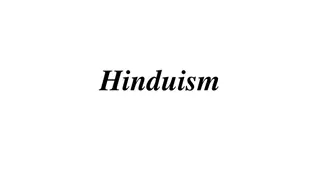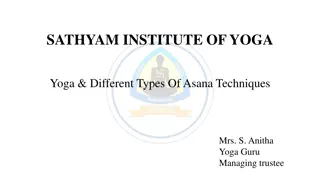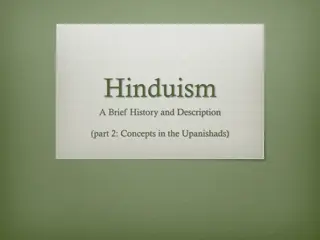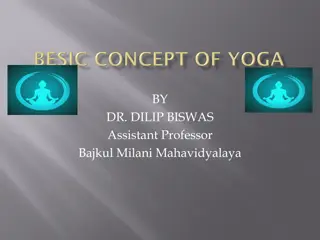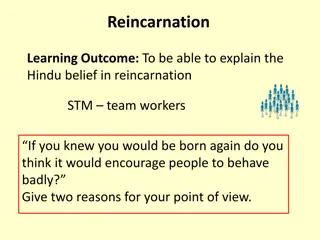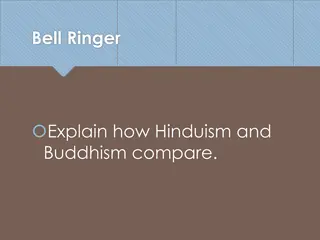Features of Jainism: An Overview Presented by Debajit Hazarika, Assistant Professor
Jainism is an ancient non-Vedic religion with roots tracing back to the times of the Indus Valley Civilization. It emphasizes non-violence, self-conquest, and spiritual liberation through 24 Tirthankaras, with Lord Mahavira being the most significant. Jainism stands out with its rejection of caste d
1 views • 7 slides
Understanding Hinduism: Beliefs, Practices, and Concepts
Hinduism, originating in the Indus Valley, is a diverse religion with beliefs in karma, reincarnation, and a multitude of deities. Concepts like Atman, Dharma, and Varna play vital roles in shaping Hindu philosophy and practices. Explore the essence of Hinduism through its ancient texts, traditions,
8 views • 50 slides
Explore the World of Yoga: Types and Techniques
Discover the essence of yoga with insights into different types of yoga practices like Karma, Bhakti, Gyana, and Raja Yoga. Learn about the union of body, mind, and soul through various yoga asana techniques, guided by the wisdom of renowned yoga guru Mrs. S. Anitha. Immerse yourself in the diverse
0 views • 21 slides
Exploring Sikhism: History, Beliefs, and Cultural Significance
Sikhism, originating in Punjab amidst Hindu-Muslim conflicts, was founded by Guru Nanak in 1469. Rejecting elements of Hinduism and Islam, Sikhism is a unique religion emphasizing oneness with God, karma, and reincarnation. Central beliefs include the unity of humanity, God's presence in all individ
0 views • 12 slides
Concepts in the Upanishads: Brahman, Atman, Maya, Samsara, Karma, and Moksha
The Upanishads introduce profound concepts such as Brahman as the cosmic power, Atman as the soul within, Maya as illusion, Samsara as the cycle of rebirth, Karma as the moral law of cause and effect, and Moksha as liberation. These teachings emphasize the oneness of all existence and the quest for
0 views • 14 slides
Understanding the Paths of Yoga: Karma, Bhakti, Gyana, Raj, and Hatha Yoga
Yoga, originating from Vedic scriptures, offers paths like Karma, Bhakti, Gyana, Raj, and Hatha Yoga to attain the ultimate reality. Each path focuses on different aspects such as action, devotion, knowledge, and physical practice, leading to a holistic development of the mind and body.
0 views • 11 slides
Unveiling the Cosmic Power of the Sun in Astrology
Discover the profound influence of the Sun as a cosmic powerhouse in astrology, shedding light on activation ages, case studies like Osho, and the significance of Sun dasa in shaping life events. Explore how Sun's positioning in the birth chart can impact one's willpower, intensity in life, and majo
0 views • 10 slides
Insights into Hinduism: Traditions, Beliefs, and Society
Hinduism, an ancient religion, developed by the Aryans in India, encompasses a diverse pantheon of gods, beliefs in reincarnation and karma, and a structured caste system. The worship of numerous gods reflects the monotheistic belief in Brahma. Social aspects, such as the caste system, play a signif
0 views • 17 slides
Hindu Belief in Reincarnation
Hinduism teaches the belief in reincarnation, where the soul moves to another being after death. Through understanding stages of life and karma, Hindus strive to move up in the cycle of samsara towards Moksha, the liberation of the soul. This cycle is based on the concept of karma, actions that impa
0 views • 10 slides
A Comparison of Hinduism and Buddhism
Hinduism and Buddhism are two major religions originating from India with key differences and similarities. Hinduism is polytheistic and focuses on dharma, karma, and moksha, while Buddhism emphasizes the Four Noble Truths and the Eightfold Path to achieve Nirvana. Both religions advocate for spirit
0 views • 15 slides

